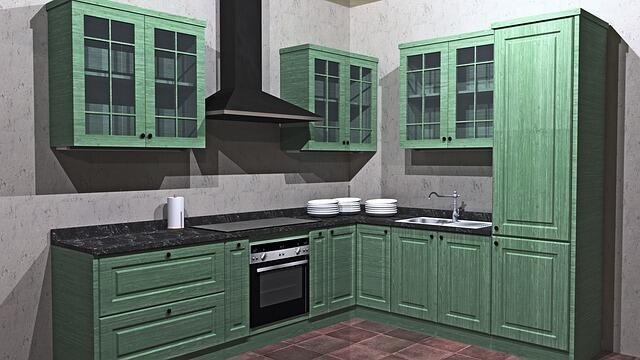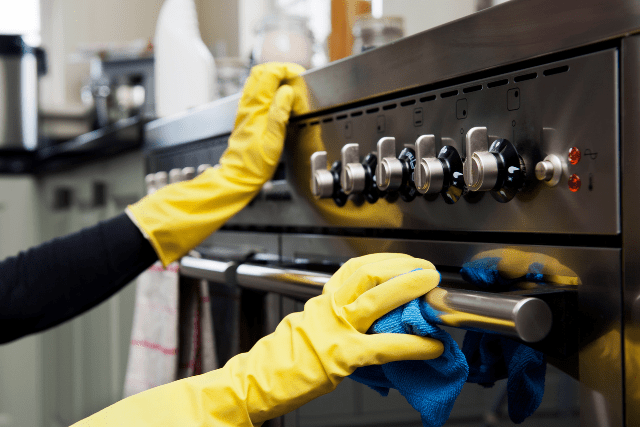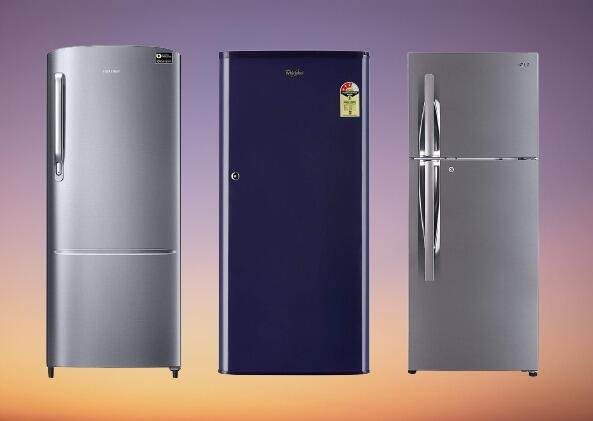Cleaning a Kitchen Chimney at Home can be time-consuming, and most people want to avoid it as much as possible. On the other hand, we all know that chimney cleaning is essential for its smooth operation. Normally, hoods contain detachable mesh or baffle filters that are easy to clean.
Clogging is an inherent issue that we all confront with our chimneys. This could result in poor performance and damage. Cleaning a chimney takes a long time. However, we guarantee that you can accomplish the task faster than ever before if you follow the below-mentioned techniques.
Why is it necessary to regularly clean the Kitchen Chimney?
Most of our Indian cooking uses a lot of spices and oils, which produces a lot of smoke. The smoke produced during preparation causes the chimney filters to become oily and sticky. The oil and grease from the smoke might become clogged between the filters, reducing the chimney’s efficiency.
If your filters are not cleaned, grease/oil drops from the filters may fall onto the stove’s open flame, causing a fire. It could potentially get into the meal you’re preparing and taint it. Oil sticks and other gas particles frequently clog inside the filters of non-auto-clean chimneys. This has an impact on their suction power. For these reasons, your chimney must be cleaned regularly every week or as needed. You must put in a lot of effort to clean the kitchen chimney.
Are all Types of Chimney Filters Washable?
A kitchen chimney filter is a necessary component that removes impurities such as smoke, dust, fumes, odor, oil, filth, and other contaminants from the surrounding air, leaving it clean and pure. Kitchen chimney filters are divided into three groups based on the materials used in their construction: mesh filters, baffle filters, and charcoal filters.
Cassette Filter / Mesh Filter
Multiple aluminum or stainless-steel mesh layers are used to make mesh or cassette filters. These meshes have microscopic holes that catch solid pollutants like oily and greasy particles, enabling smoke to escape. These contaminants clog the microscopic pores in the meshes. The blocked filters reduce the suction power of the chimneys and increase their noise level.
As a result, mesh filters must be cleaned regularly. These mesh filters must be removed and washed at home, or a professional chimney cleaning must be hired. Despite their low cost, these filters require more care than other filter kinds.
Carbon/Charcoal Filter
Many little charcoal particles make up the charcoal or carbon filters. Impurities like oil, grease, heat, and smoke absorb themselves in the holes of charcoal carbon. They eliminate the smoke’s smells. Both duct and ductless chimneys use these filters. They are frequently used in conjunction with mesh or baffle filters because they are optional filters.
They are pricey filters that cannot be washed. The charcoal granules must be replenished every three to four months because oil and other pollutants adhere to them. The charcoal filters are well-suited to the cleaning requirements of Indian kitchens.
Baffle Filter
A stainless steel or aluminum curve flow control panel makes up the baffle filter. This one-of-a-kind design collects oily, greasy, and fume particles while allowing smoke to travel through freely. This filter separates oil and odor from smoke particles using an ingenious “cut and slash” operation.
Baffle filters are more advanced than mesh filters in terms of filtering performance. Furthermore, these filters are simple to maintain because they only need to be cleaned every 2 to 3 months. Even if oil particles become stuck on the stainless steel or aluminum layers, the suction force of the chimney is unaffected.
Baffle filters are specifically built to suit the hygiene needs of Indian kitchens.
Methods for cleaning the Kitchen Chimney
Using dishwashing liquid:
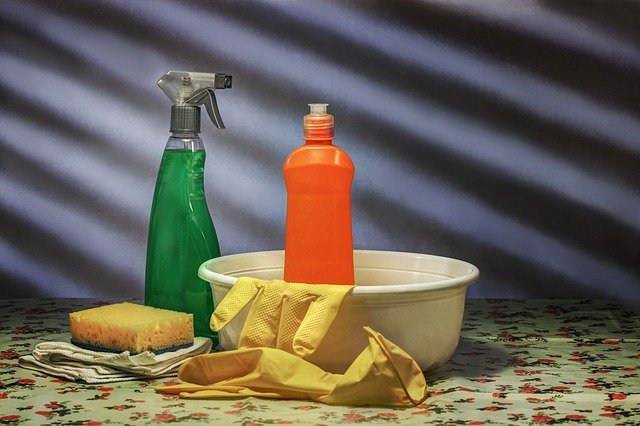
Remove the hood filters and add some washing liquid to them. Take hot, boiling water and immerse the filters in a tub deep enough to accommodate them. Allow them to sit for an hour or two. Once in a while, a non-abrasive scrub is used to clean the filters. Allow them to dry so they may be placed inside the chimney.
Using baking soda and vinegar:
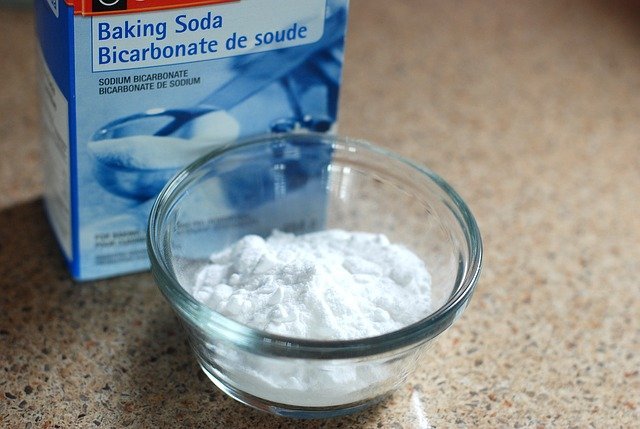
You may require room supplies such as baking soda, vinegar, and salt. Vinegar can be used as a general cleaning agent. Vinegar has disinfectant effects in addition to its acidic and mild abrasive qualities. Put the filters in a bath and fill them with hot water. Mix 2-3 tbsp baking soda, salt, and 1 cup vinegar. Allow them to soak for a brief period before cleaning thoroughly.
Using caustic soda:
Take a receptacle or tub, sprinkle the caustic soda evenly over the filters, and then pour boiling predicament. Take proper care because vapors may appear once the water is poured. Allow it to rest for an hour before rinsing with clean water and fitting it again after it has dried.
Cleaning the outsides of the hood
Scrub the outer body of the chimney with a damp soft cloth. If there is a lot of grime, add some cleaning detergent and wipe clean with a clean towel.
If you use your chimney in recirculation mode, you must use charcoal filters, which cannot be cleaned and must be replaced every 3-4 months based on usage. Returning to clean up, you will do it yourself with the help of some basic chemicals that you may find in your kitchen.
Concluding Remarks on Cleaning Kitchen Chimney
To preserve the longevity of any kitchen appliance, it must be properly maintained and cleaned regularly. A chimney is utilized in every home to remove dust, grease, and grime from the kitchen. A modern chimney has more advantages than a traditional one. You may like to visit our post on Auto-clean Chimney in this regard. Although auto-clean chimneys are more expensive than standard kitchen chimneys, they are well worth the investment.
Frequently Asked Questions
Q: How often should I clean my kitchen chimney?
A: It is recommended to clean your kitchen chimney at least once every three months to ensure optimal performance and prevent grease buildup. Regular cleaning helps maintain the chimney’s efficiency and reduces the risk of fire hazards.
Q: What are some effective methods for cleaning a kitchen chimney?
A: There are several effective methods for cleaning a kitchen chimney. One popular technique uses a mixture of hot water and a degreasing agent. Apply the solution to the chimney’s interior surfaces, particularly areas with heavy grease buildup. Allow it to sit for a few minutes, then scrub it with a brush or sponge. Rinse thoroughly with water afterward. This method helps eliminate grease and dirt, improving the chimney’s functionality.
Q: Can I clean my kitchen chimney or hire a professional?
A: Cleaning a kitchen chimney is possible, especially if you follow proper safety precautions and have the necessary tools. However, if you are unsure or uncomfortable with the process, hiring a professional chimney cleaning service is advisable. They have the expertise and equipment to clean your chimney effectively, ensuring thorough removal of grease and other contaminants.
Q: What safety precautions should I take while cleaning my kitchen chimney?
A: Safety is paramount when cleaning a kitchen chimney. Always turn off the chimney and unplug it from the power source before starting the cleaning process. Use gloves to protect your hands and wear safety goggles to shield your eyes from splashes or debris. If cleaning the chimney yourself, use a sturdy ladder and ensure it is on a stable surface. Additionally, ensure the area around the chimney is well-ventilated to prevent the inhalation of cleaning fumes.
Q: Are there any specialized tools or equipment required for chimney cleaning?
A: Yes, certain tools and equipment can facilitate the cleaning process. Some essential items include a degreasing agent or chimney cleaner, a brush with sturdy bristles, a sponge or cloth, a bucket for water, and protective gear such as gloves and goggles. It’s also helpful to have a ladder, drop cloth, or newspaper to protect your kitchen surfaces from drips or spills.
Q: How can I maintain my kitchen chimney between cleanings?
A: Regular maintenance is crucial for keeping your kitchen chimney in good condition. To maintain it between cleanings, wipe down the chimney’s exterior surface with a damp cloth to remove any accumulated dust or grease. Pay attention to the chimney’s filters and clean or replace them. Filters are responsible for trapping grease particles, so cleaning or replacing them regularly helps maintain the chimney’s efficiency.

